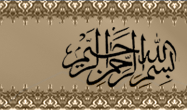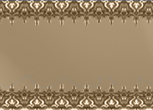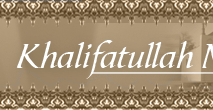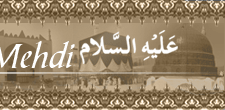| |
 |
| |
Have Hadith Clarified Things? |
|
 |
| |
|
|
"I said: 'O Prophet of Allah, I did not come to you until I had sworn more than this many times" the
number of fingers on his hands "that I would never come to you or follow your religion. I am a man
who does not know anything except that which Allah, the Mighty and Sublime, and His Messenger
teach me. I ask you by the Revelation of Allah, with what has your Lord sent you to us? He said: "With
Islam.' I said: 'What are the signs of Islam?' He said: 'To say (Kalima), I submit my face to Allah and
give up Shirk, and to establish the Salah and to pay the Zakah."'
Sunan Nasai, The Book of Zakat, Hadith 2438
....he (Gabriel) further asked, "What is Islam?" Allah's Messenger replied, "To worship Allah Alone
and none else, to offer prayers perfectly to pay the compulsory charity (Zakat) and to observe fasts
during the month of Ramadan."
Sahih al-Bukhari, The Book of Tafsir, Hadith 4777
A man said to him: "Why don't you go out and fight?" He said: "I heard the Messenger of Allah
say: 'Islam is built on five (pillars): Testimony that there is none worthy of worship except Allah,
establishing Salah, giving Zakah, Hajj, and fasting Ramadan.'"
Sunan Nasai, Grade: Sahih (Darussalam)
"A delegation of Abdul-Qais came to the Messenger of Allah and said: 'We are a tribe from Rabi'ah,
and we cannot come to you except during the sacred months. So order us with something that we can
take from you, and then we call those who are behind us to it.' So he said: 'I order you with four
things: To testify to La Ilaha Illallah, and that I am the Messenger of Allah; to establish the Salat, to
give the Zakat, and to give the Khumus from the spoils of war that you gain.'"
Tirmidhi, Grade:Sahih (Darussalam)
|
 |
| So, the “Pillars of Islam” are how many? 3 or 4 or 5, and what exactly are they?
|
 |
|
|
"Which deed is best?" he said: "Take to fasting, for there is nothing equal to it."
Sunan Nasai, Grade:Sahih (Darussalam)
The Messenger of Allah was asked: "Which deed is best?" "He said: Faith in Allah [SWT] and His messenger ."
Sunan Nasai, Grade: Sahih (Darussalam)
The Prophet was asked: which is the best action? He replied: To stand in prayer for a long
time.
Abu Dawud, Grade: Sahih (Al-Albani)
"The Prophet was asked: 'Which deed is the best?' So he said: 'Salat in the beginning of its time.'"
Tirmidhi, Grade: Sahih (Darussalam))
"A man asked the Prophet 'O Messenger of Allah, which deed is best?' He said: 'Jihad in the cause
of Allah.' He said: 'Then what?' He said: 'then Hajj Al-Mabrir.'''
Sunan Nasai, Grade: Sahih (Darussalam)
The Messenger of Allah said, "Shall I not inform you of the best of your actions which are the
purest to your Rubb, which exalt you to the high ranks, which are more efficacious than spending
gold and silver (in charity), and better for you than you should encounter your enemies whom you
will smite their necks and they will smite your necks?" They said, "Certainly." He said,
"Remembrance of Allah the Exalted."
Tirmidhi, Grade: Sahih (Isnad)
|
 |
| So, what is the deed that is best for every Muslim?
|
 |
| MENSES DEFICIENCY OR DESIGN |
|
|
Narrated Abu Sa`id Al-Khudri: Once Allah's Apostle went out to the Musalla (to offer the prayer) o `Id-al-Adha or Al-Fitr prayer. Then he passed by the women and said, O women! Give alms, as I have seen that the majority of the dwellers of Hell-fire were you (women). They asked, Why is it so, O Allah's Apostle ? He replied, You curse frequently and are ungrateful to your husbands. I have not seen anyone more deficient in intelligence and religion than you. A cautious sensible man could be led astray by some of you. The women asked, O Allah's Apostle! What is deficient in our intelligence and religion? He said, Is not the evidence of two women equal to the witness of one man? They replied in the affirmative. He said, This is the deficiency in her intelligence. Isn't it true that a woman can neither pray nor fast during her menses? The women replied in the affirmative. He said, This is the deficiency in her religion.
Sahih al-Bukhari, The Book of Menses, Hadith 304
Aishah narrated: Allah's Messenger said to me: 'Bring me the Khumrah from the Masjid.' She said: I said: 'I am menstruating.' He said: 'Indeed your menstruation is not in your hand.'
Jami at Tirmidhi, The Book on Purification, Hadith 134, Grade: Sahih (Darussalam)
|
| So, a thing not in woman’s hand and control becomes deficiency of her religion?
|
 |
|
|
I am leaving among you something which is very important and should be followed, you will not go
astray if you get hold of it after I am gone, one part of it being more important than the other: Allah's
Book, which is a rope stretched from Heaven to Earth, and my close relatives, who belong to my
household (Ahl al-Bayt). These two will not separate from one another till they come down to the
reservoir, so consider how you act regarding them after my departure."
Tirmidhi
but I am leaving among you two weighty things: the Book of Allah in which there is right guidance
and light, so hold fast to the Book of Allah and adhere to it.' He exhorted (us) (to hold fast) to the
Book of Allah and then said, 'The second are the members of my household, I remind you (of your
duties) to the members of my family."'
Riyad as-Salihin
"I have left two things with you. As long as you hold fast to them, you will not go astray. They are
the Book of Allah and the Sunna of His Prophet.
Muwatta
"I leave for you the Quran alone you shall uphold it.”
Sahih Muslim, Abu Dawud, Ibn Majah
|
| Weighty things left by the Prophet, sufficient for Ummah's guidance, were three or two or just one?
|
 |
|
|
Do not sell gold for gold and silver for silver weight for weight or of the same quality
At-Tirmidhi
(Concerning exchange) that he heard Allah's Messenger saying, "Do not sell gold for gold
unless equal in weight, and do not sell silver for silver unless equal in weight."
Sahih al-Bukhari, The Book of Sales (Bargains), Hadith 2176
Narrated Ibn `Umar: `Umar delivered a sermon on the pulpit of Allah's Apostle, saying, Alcoholic drinks were prohibited by Divine Order, and these drinks used to be prepared from five things, i.e., grapes, dates, wheat, barley and honey. Alcoholic drink is that, that disturbs the mind. `Umar added, I wish Allah's Apostle had not left us before he had given us definite verdicts concerning three matters, i.e., how much a grandfather may inherit (of his grandson), the inheritance of Al-Kalala (the deceased person among whose heirs there is no father or son), and various types of Riba.
Sahih al-Bukhari, The Book of Drinks, Hadith 5588
|
| So, what is Riba, to sell or not to sell in equal quality and quantity and what are all different types of Riba?
|
 |
|
|
Narrated `Ali bin Abi Talib: We were in the company of the Prophet on the day (of the battle) of Al-Khandaq (the Trench). The Prophet said, May Allah fill their (the infidels') graves and houses with fire, as they have kept us so busy that we could not offer the middle prayer till the sun had set; and that prayer was the `Asr prayer.
Sahih al-Bukhari, The Book Of Invocations, Hadith 6396
Yahya related to me from Malik from Da'ud ibn al-Husayn that Ibn Yarbu al-Makhzumi said, "I heard
Zayd ibn Thabit say, 'The middle prayer is the prayer of dhuhr.'“
Muwatta
"The Prophet of Allah said: 'The middle Salat is Salat Al-'Asr.'"
Tirmidhi, Grade: Sahih (Darussalam)
"The Messenger of Allah set out at nightfall, then stopped to camp at the end of the night, and he
did not wake up until the sun had risen or had partly risen. He did not pray until the sun had risen
(fully), then he prayed, and that was the 'middle prayer' (Salat Al-Wusta)."
Nasai, Grade: Da’ef (Darussalam)
|
| So, which prayer is the middle prayer: Duha, Dhur or Asr? And if this is the understanding of the middle prayer - can we let the guard down on other 4 prayers, sometimes?
|
 |
|
|
It was narrated from Anas that the Prophet offered the funeral prayer at a grave after the
burial.
Ibn Majah, Grade: Sahih (Darussalam)
‘Whoever offers the funeral prayer will have one Qirat; and whoever attends until the burial is
over, will have two Qirat.
Ibn Majah, Grade: Sahih (Darussalam))
|
| So, funeral prayer is after or before the burial?
|
 |
|
|
Narrated Ibn 'Abbas: The Prophet performed ablution by washing the body parts only once.
(Bukhari)
Narrated 'Abdullah bin Zaid: The Prophet performed ablution by washing the body parts twice.
(Bukhari)
I saw `Uthman performing ablution; he washed his hands thrice, rinsed his mouth and then washed
his nose, by putting water in it and then blowing it out, and washed his face thrice, and then washed
his right forearm up to the elbow thrice, and then the left-forearm up to the elbow thrice, then
smeared his head with water, washed his right foot thrice, and then his left foot thrice and said, "I
saw Allah's Apostle performing ablution similar to my present ablution, and then he said, 'Whoever
performs ablution like my present ablution and then offers two rak`at in which he does not think of
worldly things, all his previous sins will be forgiven."
(Bukhari)
|
| So, which one is Sahih Wudu Sunnah, washing the limbs 1 or 2 or 3 times?
|
 |
|
|
Narrated Anas bin Malik: The Prophet was neither conspicuously tall, nor short; neither, very white,
nor tawny. His hair was neither much curled, nor very straight. Allah sent him (as a Messenger) at
the age of forty (and after that) he stayed for ten years in Makkah, and for ten more years in
Medina. Allah took him unto Him at the age of 60, and he scarcely had ten white hairs on his
head and in his beard
(Sahih Bukhari)
Narrated Ibn Abbas: Allah's Messenger started receiving the Divine Inspiration at the age of forty.
Then he stayed in Makkah for thirteen years, receiving the Divine Revelation. Then he was
ordered to migrate and he lived as an Emigrant for ten years and then died at the age of 63 (years).
(Sahih Bukhari)
Ibn 'Abbas reported that Allah's Messenger (may peace be upon him) stayed in Makkah for 15
years (after his advent as a Prophet) and he heard the voice of Gabriel and saw his radiance for
seven years but did not see any visible form, and then received revelation for 10 years, and he
stayed in Medina for 10 years.
(Sahih Muslim)
|
| So, age of holy Prophet is 60 or 63? And Prophethood (and Quran revelation period) is 20 or
23- or 25-years long?
|
 |
|
|
Allah’s Messenger forbade the offering of two prayers: 1. after the Fajr Prayer till the sunrises.
2. after the Asr prayer till the sun sets.
(Bukhari)
Allah’s Messenger never missed two Rakat before the Fajr prayer and after the Asr prayer openly
and secretly
(Bukhari)
|
| What do we do, to pray or not to pray after Asr?
|
 |
|
|
Al-Masih Ad- Dajjal is blind in the right eye and his eye looks like a protruding grape.
(Bukhari)
Dajjal is blind of left eye with thick hair and there would be a garden and fire with him.
(MUSLIM)
|
| Is Dajjal blind in left or right eye or are we blind in both?
|
 |
|
|
Jesus was of red complexion.
(Bukhari)
No, By Allah, the Prophet did not tell that Jesus was of red complexion but ….man of brown
complexion….
(Bukhari)
Jesus, a man of medium height and moderate complexion inclined to the red and white colors.
(Bukhari)
Jesus son of Mary as a medium-statured man with white and red complexion
(Muslim)
|
| What is the skin color of Jesus AS
, how do we recognize him upon his 2nd coming?
|
 |
|
|
"The Messenger of Allah saw me urinating while standing, and he said: 'O 'Umar, do not urinate
standing up.' So I never urinated whilst standing after that."
(Ibn Majah, Grade: Da’ef (Darussalam))
The Messenger of Allah came to the garbage dump of some people and he urinated on it standing
up.
(Ibn Majah, Grade: Sahih (Darussalam))
|
| Astaghfirullah wa Awudhu Billahi Minash Shaytan Nir Rajeem!
|
 |
|
|
"The Messenger of Allah forbade facing the Qiblah when urinating. But I saw him, one year before
he died, facing the Qiblah (while urinating)."
(Daud, Tirmidhi, Ibn Majah, Grade: Hasan (Darussalam))
"Do not face towards the Qiblah nor turn your backs toward it when defecating or urinating, rather
face toward the east or the west."
(Nasai, Grade: Sahih (Darussalam))
Once I went upstairs in Hafsa's house and saw the Prophet answering the call of nature with his
back towards the Qibla and facing Sham
(Bukhari)
|
| Astaghfirullah wa Awudhu Billahi Minash Shaytan Nir Rajeem!
|
 |
| CUPPING (DRAWING BLOOD) WHILE FASTING |
|
|
The Prophet said: "The cupper and the one cupped have broke the fast."
(Tirmidhi, Grade: Sahih (Darussalam))
The Prophet was cupped while he was in the state of lhram, and also while he was observing a
fast
(Bukhari)
|
| So, for a fasting person, giving blood test samples breaks the fast or not?
|
 |
|
|
The Messenger of Allah [SAW] saw a man wearing a gold ring.
(Nasai, Grade: Da’ef (Darussalam))
The Prophet [SAW] forbade gold rings.
(Nasai, Grade: Sahih (Darussalam))
|
| So for men, Gold is HARAM or HALAL?
|
 |
|
|
Abu Huraira reported it was said to Allah's Messenger Invoke curse upon the polytheists,
whereupon he said: I have not been sent as the invoker of curse, but I have been sent as mercy."
(Muslim)
Anas b. Malik reported that the Messenger of Allah observed Qunut for a month in the dawn prayer
after ruku' and invoked curse upon Bani Usayya.
(Muslim)
|
| So, was he Rahmatul lil Muslimeen or Mumineen or Alameen?
|
 |
|
|
"When one of you becomes forgetful in his Salat so that he does not know if he prayed one or two,
then let him consider it one. When he does not know if he prayed three or four, then let him consider
it three, and let him perform two prostrations before he says the Taslim
(Tirmidhi, Grade: Hasan (Darussalam))
The Apostle of Allah performed two prostrations for forgetfulness after salutation and talking.
(Muslim)
|
| So, SAJADAH Sahu before saying the salaam or after, which is Sahih Sunnah?
|
 |
|
|
Allah's Messenger ordered that the dogs should be killed.
(Bukhari)
Allah's Messenger said, "A prostitute was forgiven by Allah, because, passing by a panting dog
near a well and seeing that the dog was about to die of thirst, she took off her shoe, and tying it with
her head-cover she drew out some water for it. So, Allah forgave her because of that."
(Bukhari)
|
| So, Kill or be kind to the dogs? which is Sahih Sunnah?
|
 |
|
|
`Ali was told that Ibn `Abbas did not see any harm in the Mut'a marriage. `Ali said, "Allah's Messenger
forbade the Mut'a marriage on the Day of the battle of Khaibar and he forbade the eating of
donkey's meat." Some people said, "If one, by a tricky way, marries temporarily, his marriage is illegal."
Others said, "The marriage is valid but its condition is illegal."
(Bukhari)
While we were in an army, Allah's Messenger came to us and said, "You have been allowed to
do the Mut'a (marriage), so do it."
(Bukhari)
While I was in the company of Jibir, a person came and said: There is difference of opinion amomg
Ibn Abbas and Ibn Zubair about two Mut'as (benefits, Tamattul in Hajj and temporary marriage with
women), whereupon jibir said: We have been doing this during the lifetime of Allah's Messenger (way
peace be upon him), and then 'Umar forbade us to do so, and we never resorted to them.
(Muslim)
|
| So, to Muta’ or not to, and who forbade it really?
|
 |
| ILLITERATE OR LITERATE PROPHET? |
|
|
When the Prophet intended to perform `Umra in the month of Dhul-Qada, the people of Mecca
did not let him enter Mecca till he settled the matter with them by promising to stay in it for three
days only. When the document of treaty was written, the following was mentioned: 'These are the
terms on which Muhammad, Allah's Messenger agreed (to make peace).' They said, "We will not
agree to this, for if we believed that you are Allah's Messenger we would not prevent you, but
you are Muhammad bin `Abdullah." The Prophet said, "I am Allah's Messenger and also
Muhammad bin `Abdullah." Then he said to `Ali, "Rub off (the words) 'Allah's Messenger"', but
`Ali said, "No, by Allah, I will never rub off your name." So, Allah's Messenger took the
document and wrote, 'This is what Muhammad bin `Abdullah has agreed upon: No arms will be
brought into Mecca except in their cases, and nobody from the people of Mecca will be allowed to go
with him (i.e. the Prophet (even if he wished to follow him and he the Prophet will not
prevent any of his companions from staying in Mecca if the latter wants to stay.'…
(Bukhari)
When Allah's Messenger was about to leave this world, there were persons (around him) in his
house, 'Umar b. al-Kbattab being one of them. Allah's Apostle said: Come, I may write for you a
document; you would not go astray after that. Thereupon Umar said: Verily Allah's Messenger is
deeply afflicted with pain. You have the Qur'an with you. The Book of Allah is sufficient for us. Those
who were present in the house differed. Some of them said: Bring him (the writing material) so
that Allah's Messenger may write a document for you and you would never go astray after
him And some among them said what 'Umar had (already) said. When they indulged in nonsense
and began to dispute in the presence of Allah's Messenger, he said: Get up (and go away)
'Ubaidullah said: Ibn Abbas used to say: There was a heavy loss, indeed a heavy loss, that, due to
their dispute and noise.
(Muslim)
|
| So, our honarable PROPHET UNLETTERED OR LITERATE?
|
 |
|
|
The list is long (articles of faith 4 or 5 or 6, saying Aameen loudly or softly, Tarawih 8 or 20, so on and
so forth…) the more you dig the more you discover!
Religion aside, what do you think of a person who does two opposite things and holds and preach
two diagonally opposite opinions?
Do you still really think (and by doing so, charge that) the Prophet said or did two exactly and
diagonally opposite things? (Nauzubillah)
|
| What happens to the credibility and purpose of a 'religious' corpus when it is found to have
abundant and irreconcilable contradictions within them?
|
|
 |
|
|
|
|
|








